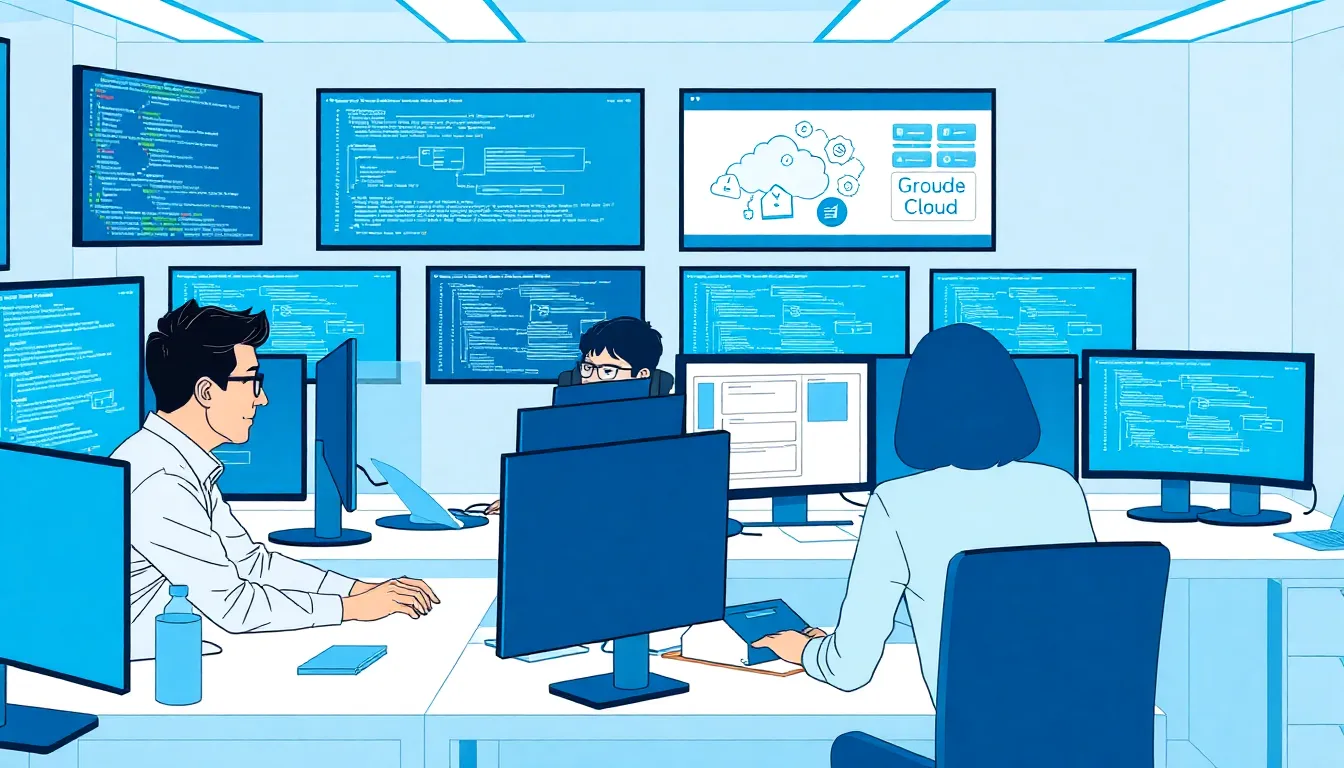Table of Contents
ToggleIn the fast-paced world of tech, DevOps engineers are the superheroes wearing hoodies instead of capes. They bridge the gap between development and operations, ensuring that software delivery is as smooth as butter on a hot skillet. But what makes a DevOps engineer truly exceptional? It’s not just the ability to fix things when they break; it’s a unique blend of skills that turns chaos into harmony.
Overview Of DevOps Engineer Skills
DevOps engineers possess a diverse set of skills essential for fostering collaboration between software development and IT operations. Their expertise spans several key areas, including:
- Infrastructure Management
- DevOps engineers manage cloud platforms such as AWS, Azure, or Google Cloud.
- Automation tools like Terraform or Ansible streamline deployment processes.
- Continuous Integration and Continuous Deployment (CI/CD)
- Proficiency in CI/CD pipelines enhances delivery speed.
- Tools like Jenkins, GitLab CI, and CircleCI facilitate automation.
- Scripting and Coding
- Familiarity with languages like Python, Bash, or Ruby simplifies automation.
- Writing scripts enhances system maintenance and integration tasks.
- Monitoring and Logging
- Utilizing tools like Prometheus, Grafana, or ELK Stack ensures application performance and reliability.
- Setting up alerts helps identify issues proactively.
- Version Control Systems
- Mastery of Git enables effective collaboration and change tracking.
- Understanding branching strategies improves project organization.
- Containerization and Orchestration
- Knowledge of Docker and Kubernetes supports efficient application deployment.
- Microservices architectures allow for scalability and flexibility.
- Networking and Security
- Understanding network protocols and security practices safeguards applications.
- Implementing firewalls and APIs protects sensitive data.
Each skill directly contributes to enhancing the efficiency of development and operations. A well-rounded DevOps engineer not only tackles technical challenges but also promotes a culture of collaboration and innovation within teams. By leveraging these skills, they streamline processes and drive successful outcomes in software delivery.
Key Technical Skills


DevOps engineers possess a variety of technical skills that enhance collaboration and streamline processes in software development and IT operations.
Programming Languages
Programming languages form the foundation of DevOps practices. Proficiency in scripting languages like Python and Bash facilitates automation, while understanding Java or JavaScript aids in application development. Familiarity with languages such as Go and Ruby enhances versatility in deployment tasks. Mastering these languages enables DevOps engineers to create scripts that automate repetitive tasks, manage configurations, and streamline workflows effectively.
Cloud Computing
Cloud computing skills are vital for DevOps engineers. They often work with platforms such as AWS, Azure, and Google Cloud to deploy and manage applications. Knowledge of Infrastructure as Code (IaC) tools like Terraform and CloudFormation allows for efficient resource management and provisioning. Familiarity with cloud services and architectures improves scalability, resilience, and cost-effectiveness in application deployment, enabling teams to innovate quickly and reliably.
Containerization
Containerization skills play a critical role in modern DevOps practices. Tools like Docker enable DevOps engineers to package applications into containers, ensuring consistency across environments. Mastery of orchestration platforms like Kubernetes enhances deployment efficiency, scaling, and management of containerized applications. Understanding networking and storage within container environments further optimizes resource usage, contributing to more responsive and adaptive software development cycles.
Collaboration And Communication Skills
Collaboration and communication skills are vital for DevOps engineers. These skills ensure seamless interactions between development and operations teams, fostering a culture of teamwork.
Teamwork
Teamwork is essential for DevOps engineers. They work closely with diverse teams, including developers, QA testers, and IT operations. This collaboration helps in identifying and resolving issues quickly. Engineers leverage agile methodologies to promote iterative progress and continuous feedback, enabling teams to adapt to changing requirements effectively. Regular stand-up meetings and collaboration tools like Slack or Microsoft Teams facilitate open communication and alignment. This collective approach enhances problem-solving capabilities and accelerates project delivery.
Stakeholder Engagement
Stakeholder engagement plays a critical role in DevOps. Engineers interact with diverse stakeholders, including management, clients, and project owners. Effective communication ensures all parties understand project goals, timelines, and challenges. Regular updates and feedback sessions promote transparency and facilitate informed decision-making. Engaging stakeholders through well-structured documentation helps in addressing concerns early and adjusting priorities when required. This proactive approach fosters strong relationships and aligns project outcomes with organizational objectives.
Problem-Solving And Analytical Skills
Problem-solving and analytical skills play a crucial role in a DevOps engineer’s effectiveness. Engineers analyze complex systems and identify issues promptly, determining the best solutions to maintain system reliability. They utilize various methodologies and tools to break down problems, allowing for a structured approach to troubleshooting.
- Root Cause Analysis: Engineers perform root cause analysis (RCA), a systematic method for identifying problems’ origins. This process minimizes repeat issues and ensures systems operate efficiently.
- Data Analysis: Engineers use data analytics to monitor application performance and user behavior. Tools like Elasticsearch and Splunk facilitate insights that drive decision-making, leading to improved release cycles.
- Testing and Validation: Engineers design tests that validate system integrity. By employing automated testing frameworks such as Selenium and JUnit, they streamline quality assurance processes, ensuring high-quality releases.
- Risk Assessment: Engineers conduct risk assessments to identify vulnerabilities in applications and infrastructure. Understanding potential threats allows for proactive measures to secure sensitive data.
- Dependency Management: Engineers assess dependencies in software development, managing libraries and components effectively. Awareness of dependencies aids in complex application builds, reducing compatibility issues.
- Incident Management: Engineers implement incident management processes. They rely on frameworks like ITIL to ensure structured responses to incidents, minimizing downtime and disruption.
By cultivating problem-solving and analytical skills, DevOps engineers enhance their ability to improve system reliability and efficiency. These skills strengthen teams’ capacity to overcome challenges and achieve operational excellence.
Continuous Learning And Adaptability
Continuous learning and adaptability define success for DevOps engineers. The tech landscape evolves rapidly; engineers must stay current with the latest tools, practices, and methodologies. Actively pursuing professional development through online courses, certifications, and workshops proves essential. For instance, an engineer might obtain AWS Certified Solutions Architect or participate in Kubernetes certification programs, enhancing their expertise in cloud technologies.
Adapting to new challenges occurs frequently. Engineers tackle emerging technologies, frameworks, and industry trends that require ongoing education. Engaging with communities, attending industry conferences, and collaborating on open-source projects supports this growth. For example, participating in webinars on DevSecOps principles fosters an understanding of integrating security into the DevOps pipeline.
Exploring innovative practices enhances skills. Engineers often experiment with new tools like GitOps or Shift Left Testing. This experimentation fosters a culture of trial and error, encouraging teams to implement improvements swiftly. By embracing change and learning from failures, they develop resilience and agility.
Leveraging feedback from peers and stakeholders helps refine approaches. Regularly soliciting input during retrospectives or performance reviews sharpens their operational strategies and identifies areas for improvement. This commitment to growth ensures engineers can face challenges confidently and meet organizational demands effectively.
Continuous learning and adaptability are critical for DevOps engineers. These attributes drive innovation, enhance problem-solving abilities, and facilitate seamless collaboration. By prioritizing growth and embracing new tools and practices, DevOps engineers maintain relevance and contribute significantly to their teams’ success.




